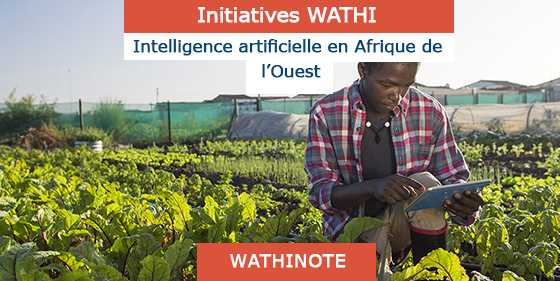

Author: Mfon Udechukwu
Affiliated organisation: AIDA (Artificial Intelligence Development Agency)
Site of publication: https://ai4da.com/
Type of publication: Article
Date of publication: August 2021
Nigeria is an important regional player in Africa, accounting for about half of West Africa’s population, at 202 million people and one of the largest youth populations in the world.
While Nigeria is a regional economic giant with abundant resources and human capital, the pace of innovation and Artificial Intelligence (AI) adoption has been slow for many reasons, ranging from lack of adequate knowledge about AI to infrastructure and access to data.
Nevertheless, the government recognizes Artificial Intelligence’s potential to contribute to human efficiency and solve challenging problems in various sectors like education, health, finance, and agriculture. To this end, in November 2020, the government established the National Center for Artificial Intelligence and Robotics (NCAIR).
Public sector-driven AI initiatives
To support economic diversification and sustainability, NCAI is collaborating with relevant stakeholders and researchers to maximize and utilize the benefits offered by AI toward achieving its strategic roadmap plan. Presently, AI-driven solutions have been slowly integrated into different areas in the country, driven by both the public and private sectors.
While Nigeria is a regional economic giant with abundant resources and human capital, the pace of innovation and Artificial Intelligence (AI)
Private sector-driven AI Initiatives
Despite being disadvantaged in terms of limited access to AI training and infrastructure, most of the AI activities happening in the Nigerian ecosystem is driven by its primarily young population. To solve one of Nigeria’s most significant challenges, which is access to an affordable and stable power supply, a problem that affects more than half of its population, Renewable Africa 365 is working with local communities to install solar power substations known as renewable energy microgrids. Microgrids can deliver electricity to small communities of 4000 people. The team built an AI system that identifies regional clusters in Nigeria where renewable energy microgrids are most viable and likely to impact the community.
In Agriculture, some farmers and agribusinesses are adopting technology into their operations to increase efficiency and productivity. One notable mention is the Nigerian AI startup company Airsmart Limited, which launched an AI software to help farm owners access actionable information such as type of crop to farm with the soil temperature and moisture, crop count on the farm, weed detection, and possible crop diseases.
Nigerian Banks have rapidly deployed AI tools into their operations to stay ahead of the competitive market and improve financial transaction processing. For example, in 2019, United Bank for Africa (UBA) launched its first AI chatbot named Leo. Leo is a virtual Banker, a chatbot created to meet their customers’ needs.
AI-driven solutions have been slowly integrated into different areas in the country, driven by both the public and private sectors
Globally, the healthcare sector is evolving rapidly and experiencing a shift from a human-oriented to a technology-oriented era. Advancement in Artificial Intelligence has contributed positively to the efficiency of healthcare from early diagnosis and detection of illnesses to improved medical research on treatments. The healthcare sector in Nigeria is complex, faced with multiple challenges such as high infant mortality rate; Ubenwa, a Nigerian-Canadian startup, is leveraging AI to create accessible clinical-grade infant monitoring tools.
Bridging the AI gap in Nigeria
As the Nigerian AI space continues to pick up slowly, many underlying challenges such as funding AI research in universities, capacity building, daa availability, digital infrastructure, and development of a human-centred National AI policy will need to be addressed for the country to enjoy the benefits of deploying AI fully.
Despite being disadvantaged in terms of limited access to AI training and infrastructure, most of the AI activities happening in the Nigerian ecosystem is driven by its primarily young population
AI-driven solutions have been a powerful driver of economic growth in low-, middle-and high-income countries. In addition, they have contributed to developing strategies to combat the COVID-19 pandemic and other health-related problems like early maternal mortality, preventable maternal deaths among women in Africa and disease prevention and diagnosis. However, with this technological growth sprout comes a growing need for expertise and regulation. Therefore, there is an urgent need for the government to accelerate infrastructure development and build AI technical know-how through the NCAIR by partnering with tech giants, foreign start-ups as well as supporting local companies to develop AI skills that will empower its youths with relevant skills needed to drive business innovation in the fourth industrial revolution, and further provide job opportunities to its young population, curbing high unemployment rates in the country.
Les Wathinotes sont soit des résumés de publications sélectionnées par WATHI, conformes aux résumés originaux, soit des versions modifiées des résumés originaux, soit des extraits choisis par WATHI compte tenu de leur pertinence par rapport au thème du Débat. Lorsque les publications et leurs résumés ne sont disponibles qu’en français ou en anglais, WATHI se charge de la traduction des extraits choisis dans l’autre langue. Toutes les Wathinotes renvoient aux publications originales et intégrales qui ne sont pas hébergées par le site de WATHI, et sont destinées à promouvoir la lecture de ces documents, fruit du travail de recherche d’universitaires et d’experts.
The Wathinotes are either original abstracts of publications selected by WATHI, modified original summaries or publication quotes selected for their relevance for the theme of the Debate. When publications and abstracts are only available either in French or in English, the translation is done by WATHI. All the Wathinotes link to the original and integral publications that are not hosted on the WATHI website. WATHI participates to the promotion of these documents that have been written by university professors and experts.
